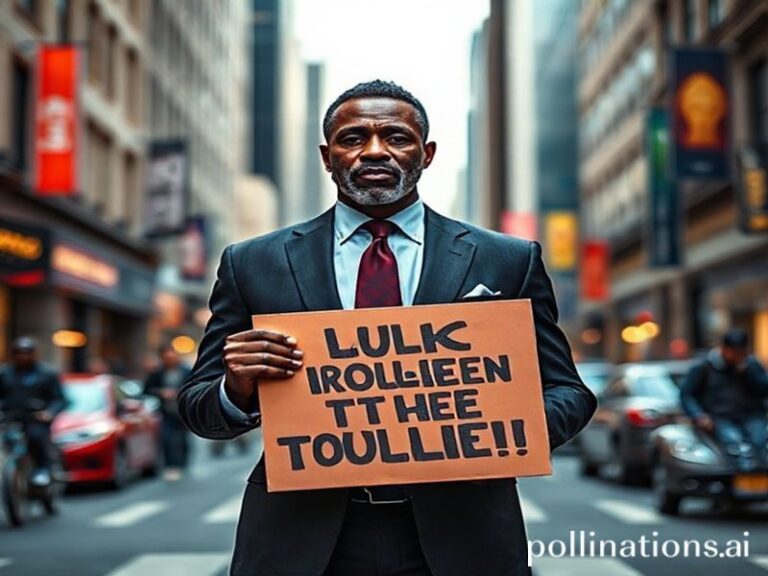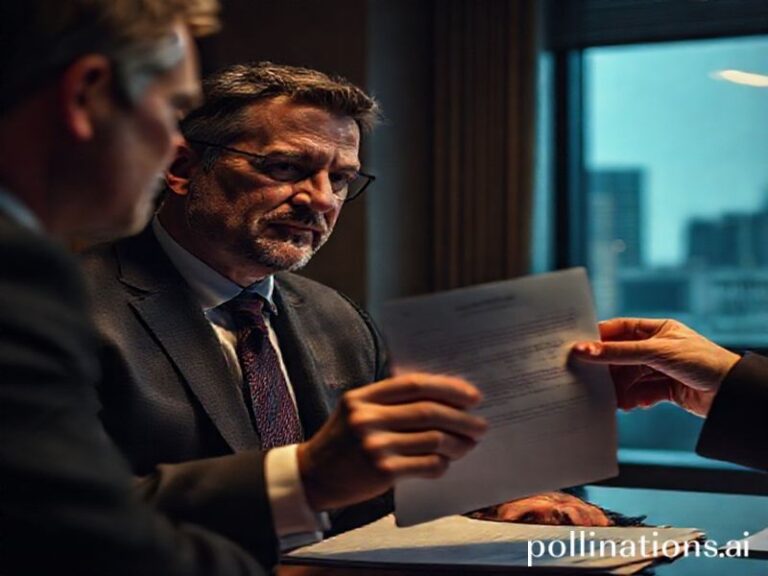One Decimal Point to Rule Them All: How Max Johnston’s Typo Sparked the Global Chickpea Meltdown
Max Johnston: The Mid-Level Bureaucrat Who Accidentally Shook the World
By “P. W. Blister,” Senior Correspondent, Dave’s Locker Global Desk
VIENNA—At first glance, Max Johnston looks like the kind of man airports were built to ignore: mid-forties, off-the-rack suit the color of yesterday’s oatmeal, boarding pass perpetually creased in the exact same place. His passport—issued by one of those mid-sized Commonwealth nations whose flag is two rectangles and a shrug—contains stamps so bureaucratically perfect they could be used to calibrate scanners. For twenty-three years he has been a “Senior Harmonization Liaison” at the International Transport & Customs Optimization Forum, a UN-adjacent body whose acronym (ITCOF) sounds like a sneeze and whose annual budget is smaller than the coffee allowance at COP summits.
And yet, last Tuesday, Max Johnston took a single sip of lukewarm Viennese melange, clicked “send” on an email titled “Proposed Annex 12-B: Recalibrated Harmonized Tariff Sub-Codes for Non-Perishable Re-Exports,” and detonated the global supply chain like a Black Friday sale in a nitroglycerin plant.
The problem, if one enjoys understatement, was decimal placement. Annex 12-B was supposed to reclassify re-exported dried beans under HS Code 0713.39.10. Johnston, eyes glazing over from a three-hour Zoom with Guatemala’s deputy vice-minister of legumes, accidentally typed 0713.93.10—a sequence that, in the arcane codex of the World Customs Organization, designates “radioactive isotopes, medical, life-expired.” Overnight, eleven million metric tons of chickpeas were re-tagged as low-grade nuclear waste.
Panama immediately closed the Canal to anything labeled “radioactive,” which turned out to be 42% of global bean traffic. Nairobi’s coffee traders, suddenly unable to source their usual caffeine delivery vehicles (beans being the preferred packaging material), switched to burlap sacks stuffed with newspaper clippings about central-bank policy. Commodity traders in Chicago, whose algorithms parse tariff codes faster than ethics, went long on lentils and short on civilization. Within 72 hours, the price of hummus in Helsinki exceeded that of saffron in Dubai, and hipsters from Brooklyn to Berlin rioted over the existential void left by $17 snack dips.
Governments, naturally, convened. The EU blamed “Anglo-Saxon decimal imperialism.” The U.S. blamed “EU bean-counting bureaucracy.” China blamed “a general lack of socialist vigilance in data entry.” Only the Swiss, whose warehouses now brimmed with mislabeled legumes glowing ominously under fluorescent light, saw opportunity: they launched the world’s first Bean Reserve Currency, backed 1:1 by chickpeas stored in repurposed gold vaults. Analysts at Goldman Sachs hailed it as “a pulse-based store of value with low correlation to traditional risk assets,” which is banker-speak for “we have no idea what’s happening, but we’ll charge you 2% anyway.”
Meanwhile, Max Johnston—unaware that his spreadsheet had become the butterfly wing to the global hurricane—spent the week troubleshooting a jammed printer in ITCOF’s basement. When reporters finally cornered him, he blinked twice and asked whether anyone had tried turning the economy off and on again.
The moral, if one insists on such things, is that the twenty-first century runs on people like Johnston: interchangeable functionaries whose greatest daily risk used to be paper cuts. Now they wield more disruptive power than most parliaments, armed only with Microsoft Excel and the attention span of a fruit fly on TikTok. The world’s supply chains have become so absurdly optimized that a single misplaced keystroke can starve a continent of falafel.
So raise a glass—preferably something gluten-free—to Max Johnston, accidental architect of the Great Chickpea Crisis of ’24. Somewhere in a windowless office, he is quietly correcting his typo and resubmitting Annex 12-B. The markets will stabilize, the hummus will flow again, and consultants will bill $400 an hour to explain why “better dropdown menus” are the key to geopolitical stability.
Until, of course, the next Johnston hits send.







